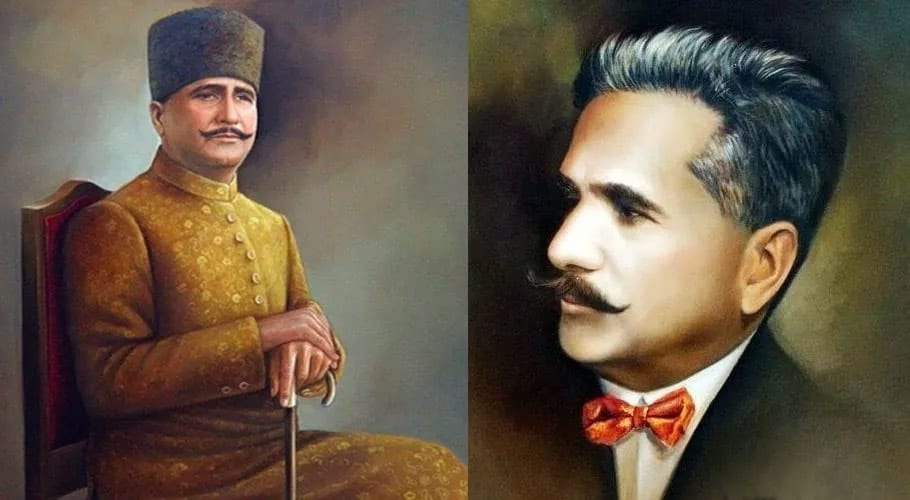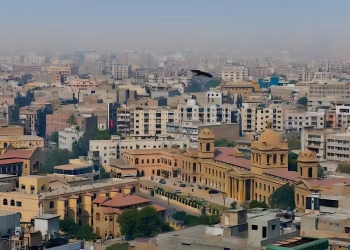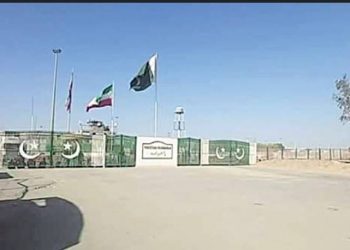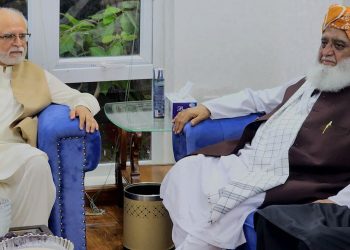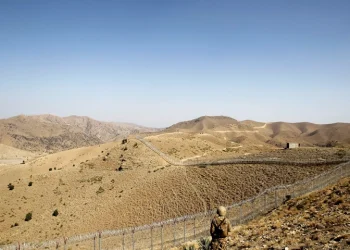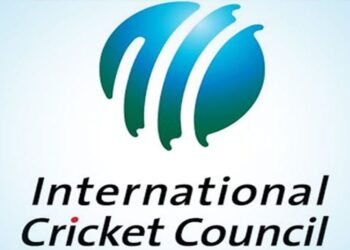The 143rd birth anniversary of philosopher-poet Dr Allama Muhammad Iqbal is being observed with national fervor to recognize his effort and services for a separate homeland for the Muslims of the Subcontinent.
An investiture ceremony of change of guard was held at the mausoleum of Allama Iqbal in Lahore on Monday morning. A smartly turned out contingent of Pakistan Navy assumed the responsibility of guard from Pakistan Rangers.
Messages of President Alvi, PM Imran
In their separate messages on Iqbal Day, President Dr Arif Alvi and Prime Minister Imran Khan have urged on the need to stand united, set aside differences and work commitment for the socio-economic uplift of the country.
The president underscored the need of following Allama Iqbal’s teachings on Islam and his philosophy of ‘khudi’ that believed in the promotion of self-respect and human dignity, to make Pakistan a prosperous nation.
Prime Minister Imran Khan in his message also emphasized collective responsibility in building the nation while exploring Allama Iqbal’s thoughts.
He said Iqbal not only dreamt of Pakistan but also reflected upon the issues it would have to face after its creation.
He underlined the need of seeking guidance from Iqbal’s thoughts to find a solution to the issues being faced by the nation and transforming it into an Islamic welfare state.
Who was Allama Muhammad Iqbal?
Mohammad Iqbal was born on 9 November 1877 in Sialkot Punjab province of Pakistan. Iqbal’s father, Nur Muhammad was a tailor, who lacked formal education, but who had a great devotion to Islam and a mystically tinged piety.
Iqbal’s mother was known in the family as a “wise, generous woman who quietly gave financial help to poor and needy women and arbitrated in neighbor’s disputes.
Education and career
At the age of four, young Iqbal was sent regularly to a mosque, where he learned how to read the Quran in Arabic.
Allama Iqbal was a prodigy. In 1885, he stood first in grade one in Scotch Mission School, Sialkot, and began to be tutored in Persian and Arabic in a mosque.
He was in class nine when as a teenager he started writing his juvenile poetry in Urdu. He passed matriculation in the first division, winning a medal with a scholarship. In his first year at Scotch Mission College, he started versifying under the pen-name of Iqbal and was published in literary journals.
He passed his BA exam in the first division and won medals in Arabic and English. Three years later, though he passed his MA Philosophy in the third division, he was the only one who passed and received the gold medal.
He was appointed professor of Philosophy at the Government College, Lahore, chosen by Professor Thomas Arnold – the British orientalist who wrote a book proving that Islam was spread in the subcontinent not by the sword but by humanist preaching – who became his patron.
Iqbal was additionally appointed as the Macleod Arabic Reader at Oriental College, Lahore, on a monthly salary of 72 rupees and one anna.
Later, he took time off from Oriental College to teach English at the Government College. His poems had started showing influence from Spinoza, Hegel, Goethe, Ghalib, Bedil, Emerson, Longfellow and Wordsworth.
He couldn’t disagree with Sir Syed Ahmad Khan whom he regarded as the Baruch Spinoza (d.1677) of Islam, rationalizing and demystifying the scriptures.
He went to Europe (1905-08) doing his Master’s and Bar at Cambridge and his Ph.D. with his thesis, ‘The Evolution of Metaphysics in Iran’ at the Munich University, becoming unbelievably proficient in German within three months.
The period 1908-25, back in Lahore, saw him produce some of his Urdu masterpieces while practicing law at the Lahore High Court.
Contributions in Urdu poetry
Allama Iqbal was a great poet, thinker and philosopher who infused a revolutionary spirit in the Muslim youth of the Subcontinent.
Iqbal was known for his legal expertise and political ideologies, but his contributions to Urdu literature are unforgettable.
He still remembered in books like, ‘Rumuz-i-Bekhudi’, ‘The Reconstruction of Religious Thought in Islam (1930)’, ‘Zabur-i-Ajam’, ‘Payam-i-Mashriq (1923)’, ‘Javid Nama (1932)’, ‘Pas Cheh Bayed Kard ai Aqwam-e-Sharq (1936)’, ‘Bal-i-Jibril (1935)’ and ‘Zarb-i-Kalim (1936)’.
Iqbal’s role in the creation of Pakistan
He was a great representative of the Subcontinent and one of the key exponents of the Pakistan Movement. Allama Iqbal had given the idea of Pakistan during the All Pakistan Muslim League session of 1930 in Allahabad (India).
He was not just a preacher and a philosopher. He stood for bravery and action, perseverance and self-reliance, and above all faith in God and devotion to Islam.
He journeyed from his pluralist view of India to a ‘preservative’ posture, advocating separate electorates and developing the first geographical map of ‘separation’ of the Muslim community in the northeast and the southeast within the subcontinent.
All-India Muslim League courted him as the leading Muslim genius and listened to his ‘separatist’ thesis at its Allahabad session in 1930.
Iqbal is considered to have given the vision for the creation of Pakistan, whereas Jinnah is considered to be the one who shaped this vision.
He contended that his idea of an autonomous Muslim state was not original but had been derived from the Arya Samaj Hindu revivalist vision of Lala Lajpat Rai of Punjab who first recommended ‘separating’ the Muslims.
As for Iqbal’s Nietzschean yearning for self-empowerment, Jinnah was made a practical example of it, as noted oddly by none other than Saadat Hasan Manto in one of his sketches.
Iqbal’s vision of Pakistan
Iqbal’s dream of the ideal Muslim country can be traced through his Lectures conveyed on Islamic philosophy.
Iqbal’s perception of the ideal Muslim country was not a theocracy but a state that attempts to realize the spiritual principles of Tawhid, equality, solidarity, and freedom in a definite human organization.
Iqbal devised some guiding principles for the democratic Islamic country of his dream. Where democracy leads to the pristine purity of Islam, which stands for spiritual democracy
The state is under the obligation to maintain the supremacy of law and to guarantee the enforcement of human rights.
Parliament is not just a consultative assembly, but is fully capable with the power to legislate while exercising its authority of ijma, and keep the right to engage in jihad, the right of further interpreting the Quran and the Sunnah or of forming a new opinion by applying analogy.
Along with the ideal state, Iqbal’s ideal society was one of the perfect social equality, founded not on an economic, but a spiritual basis, where the poor tax the rich, private ownership was a trust, and a capital was not permitted to gather so as to dominate the real producer of the wealth.
The government must enforce the rule of law
Unfortunately, Iqbal’s vision for an ideal society got blurred and was not transformed into a reality because of the failure of his successors to pursue his directions.
Several issues, including economic, energy crisis, absence of the rule of law, rampant corruption, nepotism, intolerance, violence, terrorism and low quality of life of citizens are the key challenges faced by Pakistan today.
The government must enforce the rule of law by de-weaponizing Pakistan and exercising zero-tolerance against those who are involved in acts of violence corruption, nepotism in the country.
Without political will and determination on the part of those who matter, the vision for an ideal society, as articulated by Iqbal cannot be transformed into a reality.







